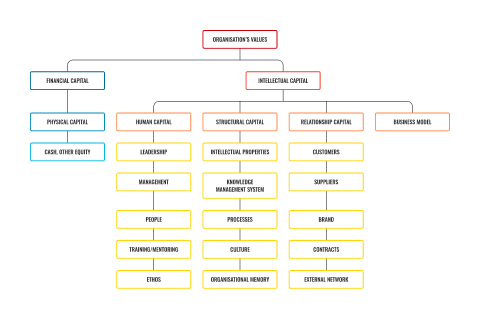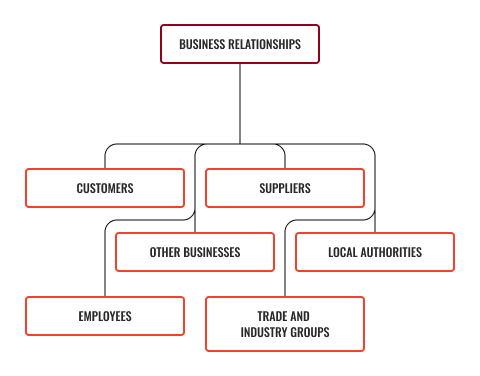
Meet Robert Wilson ...
Robert is the owner of an accounting firm, Ace Finance and Accounting (commonly referred to as Ace Finance), which is dedicated to corporate accounting. As the owner, Robert plays a key role in building and maintaining business relationships with current and potential clients and other stakeholders across different industry sectors.
His duties include:
- networking to establish business relationships
- maintaining business network connections through professional communication, providing excellent customer service, and demonstrating effective problem-solving skills
- promoting Ace Finance to his network connections as a means of building and improving existing network connections.
In this module, you will learn how to build and maintain business relationships. Throughout your learning, we will refer to specific workplace documents such as the Ace Finance Corporate Marketing Plan and relevant policies and procedures, including the Customer Relationship Management Policy and Procedure, the Networking Policy and Procedure and the Conflict Resolution Policy and Procedure.
Before we start, let us ask Robert to briefly answer four questions before we delve into the learning concepts. He will identify key workplace documents and policies and procedures related to building and maintaining business relationships. His responses to the four questions will help you understand the importance of building and maintaining effective work relationships and networks through relationship building and negotiation skills. This applies if you work within an organisation and provide (or receive) a service provided by another team, or as a contractor or freelancer.
Robert responds:
Like most managers, I work in a competitive market, and growing our client base is fundamental to meeting our corporate objectives and long-term survival. Formal and informal networking is an essential strategy for establishing and maintaining business relationships. It takes time and energy to network well and I often see people who are not willing to make the effort. My networking activities include:
- regularly attending formal network industry events including conferences and trade shows
- participating in an informal networking group that meets for drinks and discussions once a month
- maintaining my membership and registration with a range of industry associations.
We have a Networking Policy and Procedure at Ace Finance to ensure that as an organisation we have a consistent approach to networking. It also means that everyone has a shared understanding of our responsibilities as representatives of Ace Finance when we are involved in networking.
It is important I develop relationships with people in networks that are both formal and informal. My formal networks include membership of the Institute of Public Accountants and attending industry conferences. I also chair a small business development subcommittee with our local Chamber of Commerce. My informal networks include catching up with other accountants socially, where we share information and there is no formal hierarchy. I also participate in local community fundraising events on a regular basis.
Regardless of the type of networking, the opportunities to connect with potential contacts are often fleeting. This means I need to get my point across as quickly and effectively as I can.
There are costs in building business relationships, such as membership fees and conference registration costs but I believe the benefits gained through networking justify the costs. For example, I attended a trade fair last year and met a graduate accountant who studied in India and Australia. She has since started at Ace Finance and been instrumental in bringing in new clients from her cultural background. In addition to these traditional networking strategies, I am keen that as an organisation we explore more contemporary approaches to establishing and maintaining business relationships. I am especially interested in social networking platforms and how to make better use of digital technologies.
It is important to remember that business relationships can be both internal (for example, senior executives) and external (for example, clients, service providers, potential clients, and government agencies). They are all important stakeholders for Ace Finance. Watch the following 3-minute video where Amanda Rose shares her tips and insights on building business relationships. As a 'strategic connector' Amanda explains how you can break the ice with senior executives and those higher up in the hierarchy at your organisation, or in the industry. She also discusses how to cultivate relationships, by assisting others when necessary and recognising what assets you bring to the relationship.
I believe there is a direct relationship between a company's market value and what we refer to as its relationship capital. As you can see from the following diagram relationship capital (which is part of an organisation's intellectual capital) includes relationships with customers, suppliers, brand, contracts and external networks. These relationships are also known as the 'intangible assets' of a modern organisation. This simple diagram keeps me focused on the purpose of investing time and money into business relationships.
Intellectual capital: the intangible assets of a modern organisation

Savvy businesspeople invest in building relationships because relationship capital is as important as financial capital for organisations. If you would like to explore the concept of relational capital, I think you may find the blog post Relational Capital | Intellectual Capital Management informative.
Robert responds:
A business network should be a qualified, select group of people that you can count on. I often seek support, direction and insight from my various network affiliates.
When I am considering business network groups to join, I look for groups that will provide learning opportunities, a diverse range of members (including people or organisations I may not normally connect with), and that the group has a clear purpose and intent to assist my industry. Networking is a great way to promote and market your organisation especially if you are on a limited budget. Keep this in mind if you are starting out on a new business and wanting to establish good relationships with others.
As an organisation, we have corporate business objectives which currently include increasing our market share in regional areas of New South Wales and engaging more with regional producers. These objectives are detailed in our Corporate Marketing Plan. The marketing plan also identifies opportunities for building Ace Finance's presence and influence within networking groups and to enhance its profile through better networking. We have identified that providing financial literacy training provides an opportunity for extending our networks. Therefore our staff will seek to identify network groups to whom this training will be of interest.
In creating good business relationships it is important to strike a balance between giving and taking. Maintaining a balanced partnership requires knowing when to ask for help and when to provide help in return. Generally, you need to establish good business relationships with a range of people.
Business relationships


Robert responds:
Effective communication is a major component of maintaining both personal and business relationships! Regardless of the communication channel you use, staying connected with clients and stakeholders on a regular basis is important to maintaining relationships. Communication skills are used when giving and receiving information. Effective communication skills involve listening, speaking, observing and empathising. These are all important and need to be used regardless of the communication channel. Common communication channels are face-to-face interactions, phone conversations and digital communications, such as email and social media platforms.
Regardless of the communication channel or technology, in terms of networking I always:
- communicate in a professional manner
- acknowledge and thank someone who has provided a referral or a lead
- have business cards ready to distribute
- offer my assistance if required.
Our Customer Relationship Management Policy and Procedure provides guidance to all staff for establishing, building and maintaining business relationships and when engaged in professional networking activities. It is essential that all staff are mindful of confidentiality and this applies to our clients and the organisation. Staff are not allowed to share confidential information about clients or commercial-in-confidence information about Ace Finance. In addition, staff are not allowed to share internal communication channels such as our staff newsletters, internal podcasts or our intranet (which includes internal policies and procedures and other business-related information).
Effective networking may lead to a formal business relationship, for example entering a partnership arrangement with a supplier. Problems may arise in the relationship, and misunderstandings, conflict, and errors may occur from time to time. In these situations, negotiation, conflict resolution and problem-solving skills are vital for maintaining business relationships. If an issue does arise, I acknowledge it quickly, investigate the incident, formulate a plan to resolve the issue, and follow up with the affected party. This approach has worked well for me in the past. To assist staff manage conflict (internal or external) we have a Conflict Resolution Policy and Procedure.
Robert responds:
As I mentioned, we are trying to make better use of new and emerging digital technologies for networking and establishing, maintaining and building and improving business relationships. To this end, we now have a Technology, Collaboration and Communication Policy and Procedure to help staff use technologies effectively and confidently. The following table shows where we are now technology-wise and where we hope to be by the end of the next financial year.
| Where we are | Where we aim to be |
|---|---|
|
Microsoft email and Skype |
|
We may also explore networking sites such as LinkedIn, EventBrite, Meetup and Business Chicks to assess their capabilities and establish if they are appropriate for our networking objectives. Whilst we intend to use technologies as part of our relationship building we also realise that regular attendance at physical networking events is vital. Even if attendees are already part of my existing business network I find there are always opportunities to promote the business. In fact, many of these people refer Ace Finance to their friends, families, and business contacts for their finance and accounting needs.

